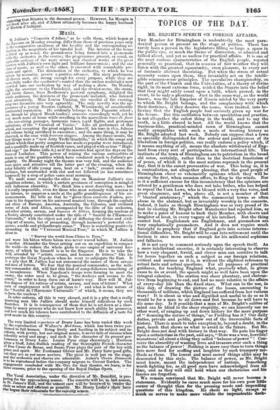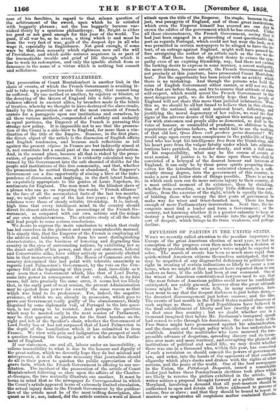TOPICS OF THE DAY.
MR. BRIGHT'S SPEECH ON FOREIGN AFFAIRS.
THE Member for Birmingham is undoubtedly the most para- doxical person at present on the stage of politics. There has rarely been a person in the legislature filling so large a space in the public eye, so much the theme of discussion, so admired and talked about, and yet so useless for practical affairs. It is one of the most curious characteristics of the English people, reputed generally so practical, that in seasons of fair weather they will listen with the greatest equanimity, even pleasure, to every sort of fantastic abstract theorizing. But when the stress of actual necessity comes upon them, they invariably act on the intelli- gible common-sense principles. The speculative championship, on the part of the Church and the Universities, of a theory of divine right, in its most extreme form, misled the Stuarts into the belief that they might safely count upon a faith, which proved, in the event, to be only a phantasy. Just in the same way, as the world knows, was the late Emperor of Russia misled by the very party to which Mr. Bright belongs, and the complacency with which their doctrines, if they deserve the name, were treated, into be- lieving that the English people had seriously given up war for the future. But this oscillation between speculation and practice, is not altogether the safest thing in the world, and to say the truth, is a little absurd to boot. All the world knows that the business-like, practical-minded town of Birmingham cannot really sympathize with such a mode of treating history as Mr. Bright adopted last week. Nobody can suppose that a town so specially. distinguished for the ardour and positiveness of its liberalism in foreign politics, can really endorse a policy which, if it means anything at all, means the absolute withdrawal of Eng- land from every sort of participation in international life. The instincts of the town of Birmingham are to patriotism in the broad old sense, certainly, rather than to the doctrinal fanaticism of of peace, of which it is the most serious reproach in the present day, that it is the surest provocative of war. This being so, it is a contradiction, not altogether pleasing, that the good people of Birmingham cheer so vehemently opinions which they will be among the first, when occasion offers, to fling to the winds. Nor is it a sufficient excuse for this inconsistency that the opinions are uttered by a gentleman who does not take bribes, who has helped to repeal the Corn Laws who is blessed with a very fine voice, and great eloquence, and Who, above all, is not a member of that
bloated aristocracy," which the commercial towns so often abuse in the abstract, but so invariably worship in the concrete. Indeed, it looks as though Birmingham was so very proud of its feat in electing Mr. Bright after Manchester had rejected him, as to make a point of honour to back their Member, with cheers and laughter at least, in every vagary of his intellect. But the thing cannot last. Englishmen are Englishmen, and gunmakers are very emphatically gunmakers. And it does not require much foresight to prophecy that if England gets into serious interna- tional difficulties, Mr. Bright will be sent into retirement until the horizon is once more serene enough for his millennial sophisms and fallacies.
It is not easy to comment seriously upon the speech itself. As a mere intellectual exercise, it is certainly interesting to observe how a very eloquent, fervid, and clever man can contrive to talk for hours together on such a subject as our foreign relations, critical and serious as it is, is without the slightest reference to actual facts and actual questions. For all purposes of practical guidance, for teaching England what, precisely what, in given cases to do or avoid, the speech might as well have been upon the integral calculus. The oration was sheer phantasy, and obstruc- tive from beginning to end, and had no more relation to the affairs of every-day life than the fixed stars. What can be the use, in this day, of drawing the picture of the losses, amounting. to thousands of millions, which England has suffered from her various wars ? It is about as wise and dignified and useful to do so as it would be for a man to sit down and fret because he will have to die some day. Is it possible that a man of Mr. Bright's calibre of mind can be blind to the sheer stupidity, we can honestly use no other word, of ranging up and down history for the mere purpose of " damning the nature of things," as Fielding has it? Our daily duties, private and public, grow out of the irreversible facts of history. There is much to eake exception to, beyond a doubt, in the past, much that shows us what to avoid in the' future. But Mr. Bright does not deal with history in that way. He puts his finger upon a certain time in the past, and says, "Here was a war, horrible! monstrous! all about a thing they called "balance of power" ! Con- ceive the absurdity of wasting lives and treasure over such a thing as the balance of power ! Nothing is more easy than to turn things into mere food for scoffing and laughter by such trumpery me- thods as these. The lowest and most sacred things alike may be desecrated by this style. The balance of power, as Mr. Bright must know, meant the independence of nations. Somehl worth fighting for, as all good men have acknowledged froltu2 time, and as they will still hold when our rhetorician and his fancies are forgotten. We remain convinced that Mr. Bright will never become a statesman. Evidently he cares much more for his own poor little corner of thought than for the pressing needs and impending questions of this kingdom. He sheds no light, except so much as serves to make more visible the impenetrable dark- ness of his faculties, in regard to that solemn question of the arbitrament of the sword, upon which he is satisfied with beggarly phrases ; not the less beggarly, because var- nished thinly by agozurious philanthropy. Mr. Bright is either too good or not enough for this year of the world. Too , if all war be, as he avers, a thing which is and must be in the very fact of war, guilt of the deepest dye in all who wage it, especially in Englishmen. Not good enough, if some wars be that iron necessity which righteous men call the will of Providence, and which noble natures acquiesce in as part of the irremediable trouble and grief of life through which it has to work its redemption, and only the ignoble shrink from or denounce in the name of a virtue which is nothing but conceit and selfishness.
I I



































 Previous page
Previous page